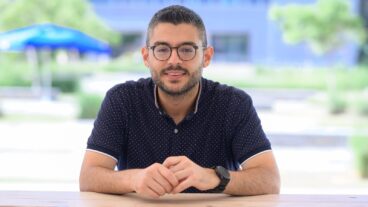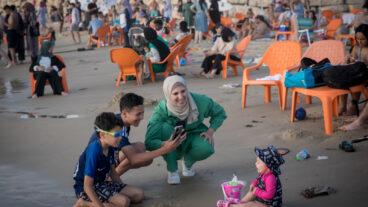An instant connection: Peter Berg directs Ashraf Barhoum in The Kingdom.Many go through life without ever finding that perfect person, never feeling an instant connection. Ashraf Barhoum is picky, too, waiting patiently and passing up second-rate opportunities for the right moment. But he lets his intuition guide him, and when he knows, he knows.
“I felt ‘that’s it,'” Barhoum recalls about his first meeting with director Peter Berg. “My meeting with Peter was a good clue that there’s chemistry as people and as people from different worlds.”
Berg had seen Barhoum in Paradise Now (2005) and loved both the film and the actor, leading him to seek out the Middle Eastern man for The Kingdom. Barhoum remembers how Berg kept telling him how much he admired his work. “I know it gave him something,” Barhoum says. “Sometimes you find yourself in other people, sometimes they find themselves in you, and the beauty of this world is when we can share our humanity. I really felt that with Peter and this cast.”
His decision to take the role of Col. Faris Al Ghazi, the Saudi police agent who helps four FBI agents crime-solve a suicide bombing in Berg’s latest drama-thriller, resulted in Barhoum finding not only one connection, but five: Barhoum costarred with Hollywood icons Jamie Foxx (Dreamgirls), Chris Cooper (Breach), Jennifer Garner (Alias) and Jason Bateman (Juno), bonding with each of them on a different level.
Before starting shooting on the first day, Berg took the cast paintball shooting to break the ice and have fun. Thus began the progression of “finding each other,” particularly for Barhoum and Jamie Foxx, whose two characters spend the most time together and act as foils for each other in the film both as fathers and agents of the law from two different cultures. “It took time with Jamie to find the dialogue, but it was a natural building,” says Barhoum.
Unfazed at being surrounded by the big names, Barhoum focused on developing his character and “giving more” to the movie than just what the script provided. “I became the character, outside of what was written,” Barhoum recounts.
To most fully embody a sensitive agent of the law dedicated to his family, justice and protocol, Barhoum studied Saudi culture.
As a Christian Israeli-Arab, Barhoum recognized that while his tradition and language is Middle Eastern, his Israeli background differentiated him significantly from a Saudi, and particularly from a Muslim. Before starting filming in spring 2006, he began reading and learning “how they live, their priorities, their mentalities,” as well as talking to people he knew to pick up the nuances of a Saudi accent.
While Barhoum strove to find the “natural connections” between the rest of the cast and his character, he inadvertently discovered new ties to Israel, the Middle East and himself as both an actor and a man.
Filming in Arizona, The Kingdom was shot during the Second Lebanon War. Though Barhoum was far from home and his family, he felt uniquely connected to the situation as he acted out a fictional Middle Eastern war zone. “It wasn’t easy, because my family was under rockets, but when reality is affecting you in that way, you don’t need to do much to act,” he remembers. “My mood was ‘I’m there’ [in the Middle East] because in my background something is happening.”
After four months of shooting, he was happy to return home to Tarshiha in the northern Galilee, relieved to be back with his family. The situation inspired self-reflection in a new way, as Barhoum found himself split between “two non-realities – a war and a movie.”
This dichotomy, combined with the international political dialogue of the film and the intense bonding with the cast, affected Barhoum’s perspective on the current state of the Middle East.
“Before, it was easy to judge,” admits Barhoum. “Now, I’m more sensitive to the political situation. I want to talk more than fight and try to understand.”
The second half of the movie focuses almost exclusively on the kidnapping of Bateman’s Jewish character by Saudi terrorists, and the rescue efforts of Barhoum and the other FBI agents working together to bring down the terrorist ring.
Barhoum admired the handling of this aspect of The Kingdom in particular, proud that it bore a different attitude toward the Middle East than other American movies in its attempt to see and understand the region and the conflict. “This is our reality, and when it comes to a scene, it is very violent – and so our judgment of it will be very violent, very painful,” says Barhoum. “But it will also be very human.”
These changes are what Barhoum credits as potentially the biggest successes of the film. Though he recognizes that his large role will open other doors for him professionally, perhaps allowing him to eventually fulfill his dream to open a theater in Tarshiha for teenagers to explore acting and the arts, Barhoum is more excited by the internal transformations sparked by the film.
“I used to say that I’m an actor and I want to change people,” Barhoum says. “Now I say that I’m an actor and the most important thing is to be changed.”












